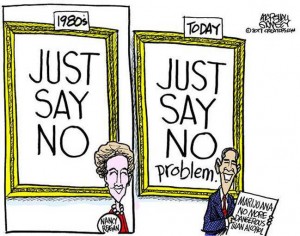Roffman, Roger. “Marijuana’s addictive risk shouldn’t be ignored.” washingtonpost.com. The Washington Post, 24. Oct. 2014. Web. 15 July 2015.
Roger Roffman, the author of “Marijuana Nation: One Man’s Chronicle of America Getting High -From Vietnam to Legislation” and a professor emeritus of social work at the University of Washington. In the mid-1980’s he was the founding director of the Innovative Programs Research Group, retiring in 2009 from the faculty he continues working with the school part-time as a co-investigator at the IPRG. Roffman agreeing with the world-wide debate on legalizing marijuana, however makes clear, along with the legalizing he also believes there should be an investment in educating the public and preventing and treating those who are addicted.
On October 24, 2014, Roffman shares his thoughts on the legalization while incorporating a personal experience with the substance. “It’s not as if I’m stoned every day,” he would say, “is it different from having a drink or two?” Roffman points out how he slowly began losing himself and distancing himself from his wife. That was when he realized that he was one of the many Americans today that become addicted to marijuana.
After years of successfully quitting, he along with some colleagues, who had also struggled with addiction to marijuana, began a research. “Today, about 2.7 million Americans over age 12 are dependent on marijuana…the risk of becoming addicted is roughly 9 percent… 17 percent for those who begin in adolescence, and for those who get high daily, the addiction risk is 25 percent to 50 percent.” Despite the statistics Roffman believes that legalizing marijuana still makes more sense than prohibition. Prohibiting marijuana would only result in violence and more competition between drug cartels nationally. While legalizing and taking actions in providing aid to those who are addicted or those who just need to be more educated on the substance would result in a better outcome.
He points out how many people have tended to exaggerate the truth about marijuana and its risks, explaining how others on the flip side of the issue over analyze the situation. “Those arguing against legalization often exaggerate marijuana’s risks, rarely acknowledging most occasional users are not harmed,” he states, followed by mentioning how legalizing marijuana is the result to a healthier and safer nation. Taking the right actions in providing for marijuana users will ultimately be much better than completely denying the use of it.
This article helped me in realizing that there is not just one side to this debate. Some may see it as either “yes legalize it, and everybody can get high” and others might see it as “no, prohibit the use of marijuana, it’s a drug, and it’s dangerous” but what I haven’t seen a lot of is how Roffman sees it. He sees it in a way that compromises both aspects. He’s demonstrating how someone could use marijuana however there will be an aid available if it were to get out of hand. I believe that this article could be useful for those who are in the middle of this debate as I am. It will allow a slightly different point of view.

